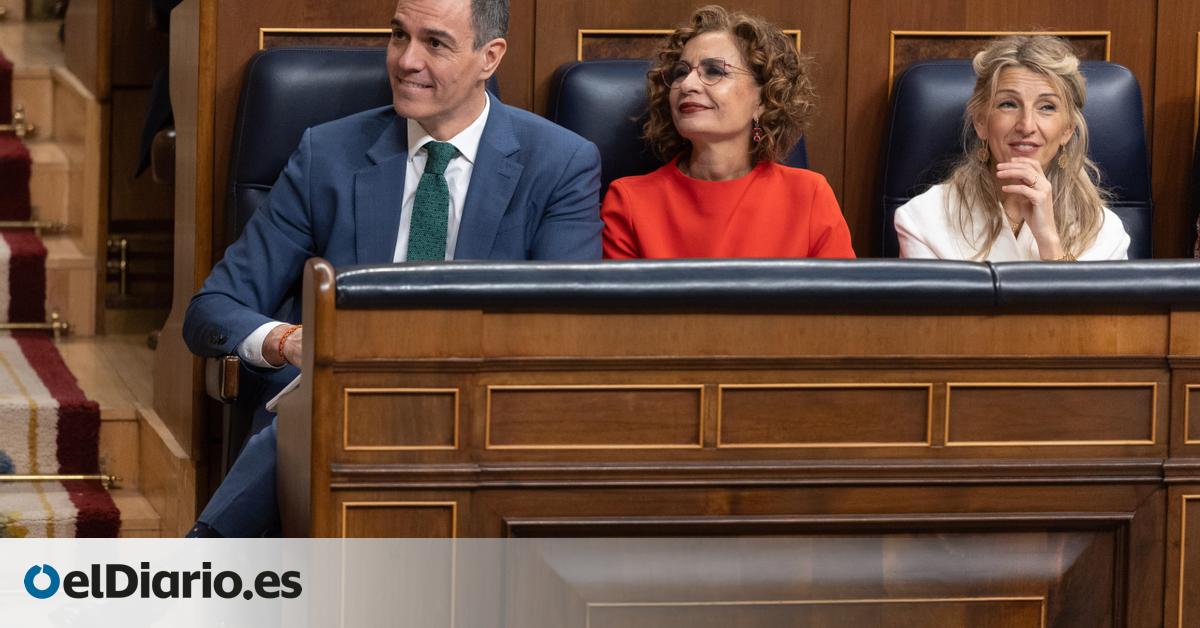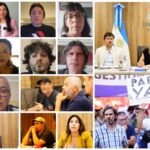
The first parliamentary week of the course will already be high political voltage for the Executive. With the intention of recovering some space in full judicial offensive and the opposition, the Government will submit in the Plenary of Congress this Tuesday and Wednesday to the vote of two emblematic measures of its social agenda. The reduction of the working day, the star project of the Ministry of Labor, which does not yet have the support of a key partner such as Junts, and the extension of paternity and maternity permits. Two votes that will test the majority of Pedro Sánchez in the lower house and will serve as a thermometer for this point of the legislature after finishing the previous course with a defeat in the decree of measures on the consequences of the blackout.
The initiative with the greatest political draft votes this week is the reduction of working hours. It is not a vote for the definitive approval of the star measure of the second vice president, Yolanda Díaz, but the first parliamentary process of the law. But until that, the mere processing is at stake because the supports are not much less tied.
In fact, both in a part of the government and among the parliamentary partners, there is strong pessimism. The messages that Junts has so far sent are overwhelming: they do not even think about giving the opportunity to the parliamentary negotiation of a norm like this.
The formation of Carles Puigdemont has expressed in public its rejection to a measure of which the employer and the small and medium -sized Catalan company also deny. And although in the Ministry of Labor they ensure that there is a negotiation in progress to adapt the norm to SMEs with the idea of content Junts, the Catalan independentists remain very reticent to withdraw the amendment to the totality that is voted on Wednesday next to those recorded by PP and Vox.
The only optimistic voices about this negotiation are precisely in the Ministry of Yolanda Díaz, which is centralizing all conversations with the Catalan independence. The second vice president herself has spoken in recent days directly with Carles Puigdemont to try to bring positions. In the ministry this vote does not give loss for loss and believe that there is still margin to negotiate. But, meanwhile, they already prepare the land to attribute responsibilities if the project decays.
“The Government of Spain has fulfilled,” Diaz said on Wednesday. Díaz takes care of the messages in public towards Junts so as not to cloud the negotiations and prefers to load against the PP for its rejection to the measure, but the idea is to transfer the message that if the measure does not go ahead it is the fault of the formations that vote against and not of the executive that drives it.
“The time has come to discuss and that citizens observe which formations are on the side of rights and who is not. Is the PP again hitting workers as it has done with the labor reform in our country? Are you going to put themselves on the side of labor denialism?” Diaz wondered.
Although the vice president is willing to take the vote towards the end and does not consider to remove the text if she confirms that she does not have the support, some voices of the parliamentary group did not hide this week her frustration with which the debate could not be held at least a week later, as the government wanted. What happens is that this month the right has a majority at the Board of Spokespersons for the Rotary Shift of the Mixed Group, which now corresponds to UPN. And PSOE already adds to change the agenda to postpone this vote a little more.
The amendments to the entire reduction of the day will be voted in a plenary session in two days for the celebration of the Diada de Catalunya on September 11. That day, of obvious symbolic relevance for independence, could influence the result of the vote if Junts intends to send a message to the government on the eve.
Paid permits and budgets
In addition, the decree for the care of children to add and PSOE negotiated to counterreloj is voted that same week before the summer break. For that vote does not exist in the rows of the Government, much less the same pessimism as with respect to the reduction of day.
First, because those of Puigdemont have never shown so many reluctance in public or private. But also because there are voices in the PSOE and add that they believe that not even the Popular Party, with its permanent frontal shock strategy, will be able to vote specifically against a social advance that raises so much consensus among public opinion.
If the Royal Decree-Law on paternity and maternity permits, which were approved on July 29, is validated, the birthmark and care will be increased until 19 weeks. A time that will double from 16 to 32 weeks in the case of permits for single -parent families, in order to match their rights to other families.
In reality, the most ambitious objective of the coalition government is to move forward two measures that are strategic in the brief agenda of legislative reforms that the Executive has been able to deploy. In case of carrying both, they interpret in the socialist ranks that it would be a true oxygen ball and a political impulse before the cartoon attempt that the opposition carries out to draw a finished cycle. And although finally it is not so, the PSOE also adventures that the return of the holidays will be less traumatic for those of Sánchez than what they expect on Genoa street.
In fact, in the Socialist Parliamentary Group there are those who close movements among parliamentary partners. “There is less tension, less hostility,” they say on the PSOE Bank of Congress with respect to recurrently discharged allies such as Podemos or Juns.
In the case of Catalan independence, this week there was one of the photos most desired by Carles Puigdemont. The expressor of the Generalitat attended something similar to political redemption after meeting with the current Catalan president, Salvador Ililla, at the headquarters of the Catalan government in Brussels in a closed meeting.
At the end of the meeting, Illa published a message on his social networks in which he reiterated his speech that “dialogue is the engine of democracy so that Catalonia continues to progress. Today we give a good example.” In response, the independence leader thanked “the kindness and conversation”, but also stressed that “in a situation of democratic normality, this meeting would have had to occur many months ago and not in Brussels but in the Palau de la Generalitat, in the capital of Catalonia. Today it was clear that we did not live in normal situation.”
No one dares to venture in the government if that approach and that gesture of so much political symbolism between Salvador Illa and Carles Puigdemont will give way to a stage of greater political collaboration between Junts and the Government. But in the Executive they are celebrated that it has been possible to restore an interlocution at the highest level with the expressor after the varapalo that assumed that the trusted person of Pedro Sánchez who served as a negotiator, Santos Cerdán has disappeared from the scene due to his entry into prison.
Regarding the budgets, and after the Puigdemont and Illa meeting, in the direction of the PSOE they believe that the departure of a negotiation that manages to carry out the first accounts of the legislature is not finished. A scenario that even disconnect from the parliamentary horizon of next week, where Junts, again, has in his hand to give some oxygen to the Executive or suffocate it a little more.
Source: www.eldiario.es

